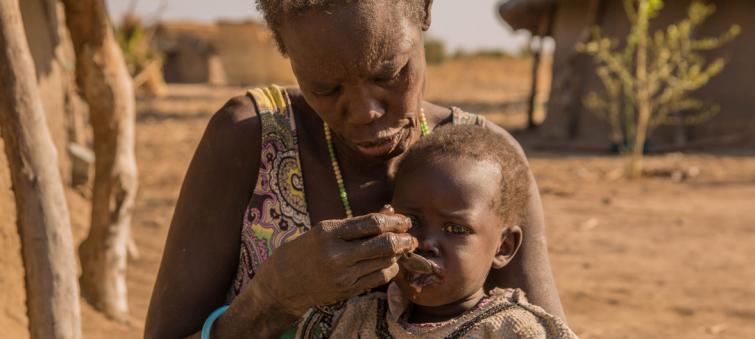
Without scaled-up humanitarian assistance ‘more and more people’ at risk in South Sudan
New York, Feb 23 (IBNS): “Alarming” food insecurity threatens nearly seven million people in South Sudan, according to a new report by three United Nations agencies appealing for greater assistance and better access to humanitarian relief.
The Food and Agriculture Organization (FAO), UN Children’s Fund (UNICEF) and the World Food Programme (WFP), in collaboration with the Government of South Sudan, released on Friday the Integrated Food Security Phase Classification (IPC), which indicated that acutely food insecure people there has shot up by 13 per cent since January last year.
“The projections are alarming and food security continues to worsen,” said Pierre Vauthier, FAO’s interim Representative in the country. “Together with the people of South Sudan, we need to act urgently to reverse this trend.”
The increase includes some 30,000 people who are already experiencing extreme food insecurity in Jonglei and Lakes states, in eastern and central South Sudan.
Food insecurity is driven by population displacement and conflict, which disrupts food production, depletes livestock and limits access to alternative food sources.
Prolonged dry spells, flooding, crop disease and pest infestation have also impacted rain-dependent agricultural production, leaving people particularly vulnerable to high prices and limited food availability.
Moreover, local cereal production in 2019 will supply 52 per cent of South Sudan’s cereal needs, compared to 61 per cent in 2018.
“Our priority is to support families to maintain and increase their production, and help agro-pastoral communities preserve their livelihoods,” Vauthier asserted.
More funds are urgently needed to scale-up humanitarian assistance, particularly as some 50,000 people will face extreme food insecurity during the leans season, between May and July.
Already food insecure, Unity, Jonglei, Upper Nile and Lakes states risk famine if the overall situation deteriorates further and humanitarian assistance dries up.
“Unless we scale up humanitarian and recovery activities soon, more and more people will be at risk,” said Simon Cammelbeeck, WFP’s Acting Country Director in South Sudan.
Malnutrition levels are already critical and threaten to worsen, with some 860,000 children under age five severely malnourished.
“This is especially worrying as those most in need of assistance are malnourished women and children,” Cammelbeeck lamented.
While the world’s youngest nation has been mired in conflict for nearly all seven years of its existence, in early 2018 President Salva Kiir and his former Vice-President and his long-time political rival, Riek Machar, signed a peace accord, which has increased some access for UNICEF.
UNICEF has made “significant progress in treating severe malnutrition in children,” with a recovery rate above 80 per cent, according to Andrea Suley, its ad interim Representative in South Sudan.
“Yet,” she explained “our nutrition programme has a funding gap of 88 per cent,” saying: “If funding is not timely secured, the children we know how to save may not make it.”
The UN agencies have conducted relief operations since the conflict erupted in late 2013, including mobile teams travelling, usually by helicopter, to reach people in isolated areas.
“Sustained humanitarian support is required to address the immediate food assistance needs,” said UN Humanitarian Coordinator in South Sudan Alain Noudehou, adding that it is also “critical to support resilience
Image Credit:FAO/Stefanie Glinski
Support Our Journalism
We cannot do without you.. your contribution supports unbiased journalism
IBNS is not driven by any ism- not wokeism, not racism, not skewed secularism, not hyper right-wing or left liberal ideals, nor by any hardline religious beliefs or hyper nationalism. We want to serve you good old objective news, as they are. We do not judge or preach. We let people decide for themselves. We only try to present factual and well-sourced news.







